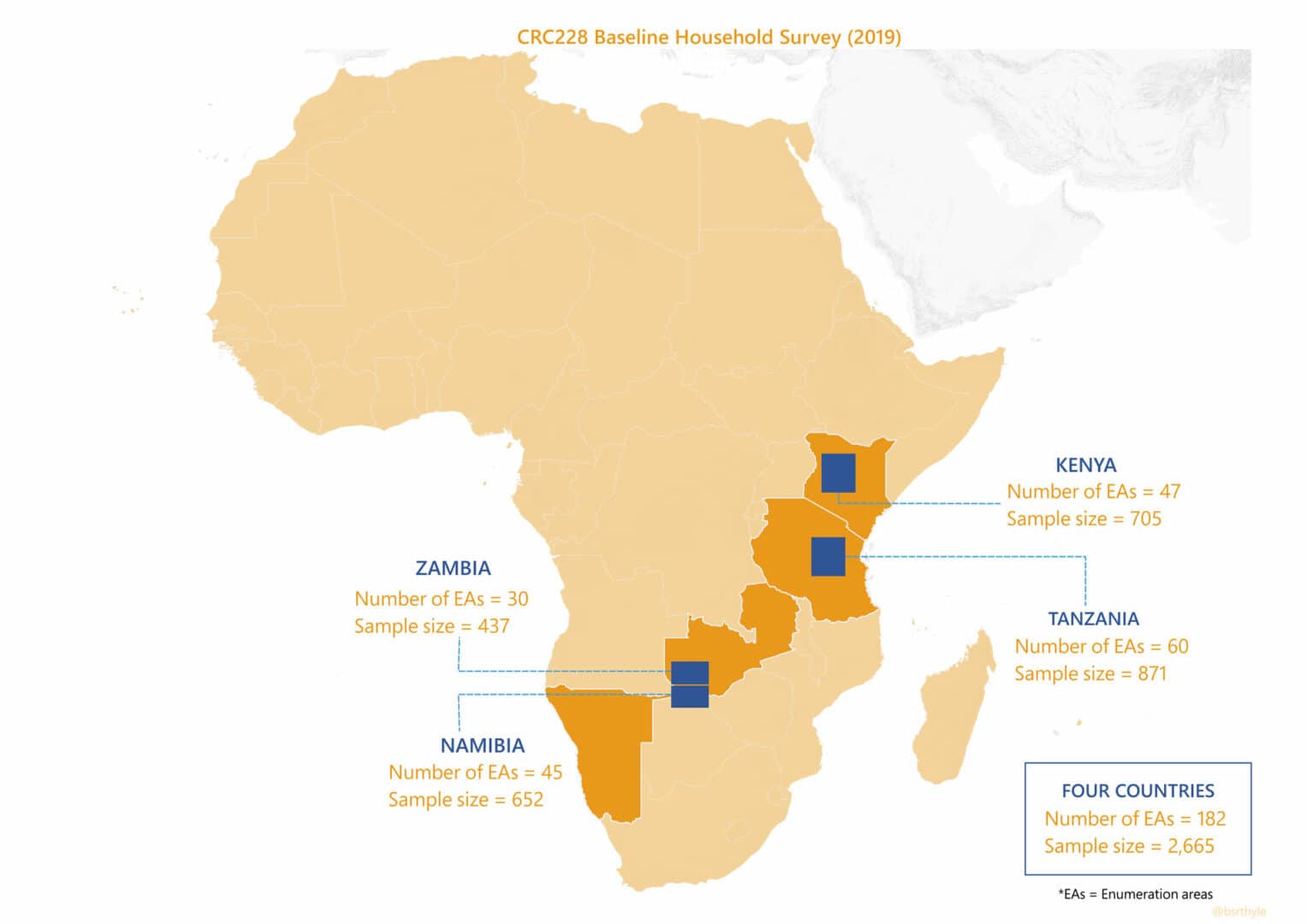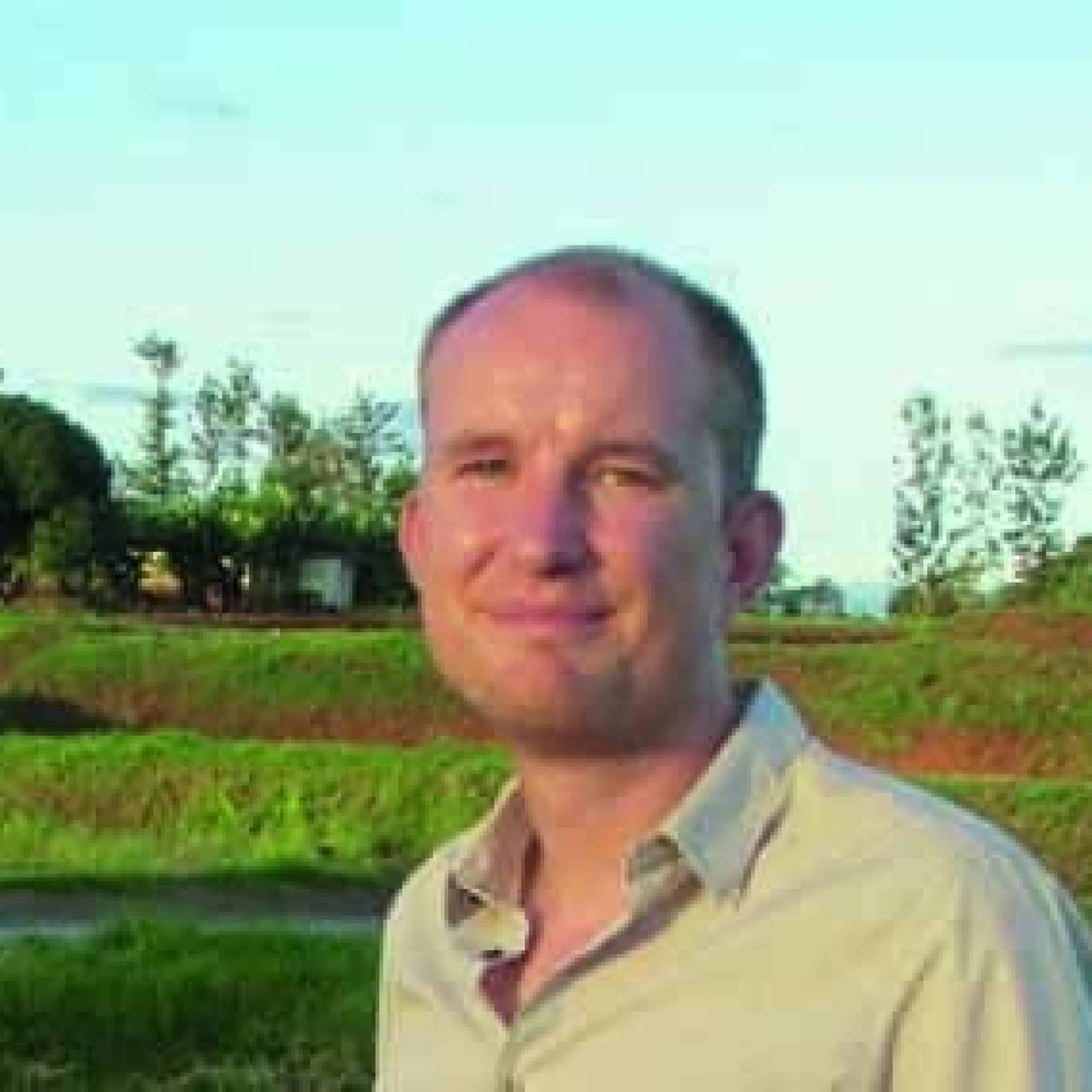CRC TRR 228 Project Z03
Combined Farm & Household Survey
Z03 Combined Farm/ Household Survey
Project Summary
The Z03 project supports all other projects in the centralized management and implementation of longitudinal quantitative surveys in all the study regions. During Phase 1 of the CRC, Z03 successfully conducted baseline survey in collaboration with ten projects (A01, A03, A04, B01, B03, B04, C01, C02, C03, and C06) in Kenya, Tanzania, Zambia, and Namibia. The combined baseline survey included almost 2,665 households across 182 enumeration areas (EAs). The baseline data is currently being used by numerous CRC and affiliated researchers and made available via a central database.
In Phase 2 of the CRC, Z03 will continue to support projects in designing and implementing survey data collection and processing. Specifically, it will facilitate a second wave of the CRC’s household survey in order to construct a panel dataset, which will allow all involved projects to better understand trends and underlying causal mechanisms and processes between variables of interest. These include, for example, the impacts of exogenous shocks (Covid-19, extreme weather events, locust infestation) or rural development interventions on food security, household-level aspirations and related sustainability outcomes.
Furthermore, Z03 will intensify collaboration and co-development of research activities conducted by local partners in all study areas. Building on the existing relationship, local partners will be systematically involved in questionnaire design, survey implementation, and data analysis.
Research Regions: Kenya, Tanzania, Namibia, Zambia.
Problem Statement
Across the CRC’s study areas, projects work on overarching research questions, such as:
- Under what conditions can conservation and agricultural intensification contribute to rural well-being poverty alleviation?
- What are the impacts of agricultural intensification and infrastructure on rural wealth and the environment?
- How are educational status/gender/age of individuals related to household decisions and related outcomes?
- How is migration linked to future-making processes?
- What role do shocks play in aspiration formation?
Answering these questions requires a systematic approach to longitudinal farm-household data collection.
Relation to the CRC
Quantitative and interdisciplinary survey data is central to the data and research needs of the CRC and its long-term planning horizon present a unique opportunity for longitudinal research. Z03 contributes to the CRC’s overarching goals by facilitating the collection of timely, high-quality quantitative data across space and time.
Beyond data collection, Z03 will provide data processing and delivery services. It counts with one postdoctoral researcher to coordinate questionnaire development, field campaigns, data collection, cleaning, and processing. In each country, two doctoral students from the projects using survey data (e.g., A01, A04, A05, B01, B02, B03, B04, C01, C02, C03) and a supervisor from a local partner will oversee the data collection in the field.
The project not only supports data collection, but also builds and maintains relationships with local authorities and research partners in order to guarantee efficient fieldwork and fruitful research collaboration.
Work Plan and Methods
- Semi-structured questionnaires cover village as well as household level characteristics to address both comparative and project-specific research questions
- Questionnaires consist of a general section, covering the same basic farm-household characteristics in all four study areas, and a set of study area specific sections
- Sample sizes, sampling strategies, and questionnaire sections (thematic areas) may differ across study areas and wave given project-specific requirements
- Several survey meetings are fostering the collaborative design of the survey, the collection, and subsequently the use of primary data
- The survey provides a basis for both region-specific research and cross-region comparisons using empirical research approaches and modelling.
Key Events
The Z03 dedicated 2019 to survey implementation, conducting the baseline household survey in 4 countries, namely; Namibia, Zambia, Tanzania and Kenya. Working with other projects and with local research partners, all surveys were conducted and successfully completed on time. Data was collected using an efficient computer-assisted personal interviewing platform, which enabled real time of transmission of data from the field without implementing analog data entry activities.
Phase 1 of the Z03 project focused on implementing a baseline survey that will support the measurement of change in study areas through a panel survey framework. During phase I, Z03 supported nine sub projects in data collection through the combined multidisciplinary farm and household survey and supporting the design and implementation of additional project-specific surveys. Using a multi-stage simply random sampling, 182 enumeration areas were selected for survey implementation and in each enumeration area, 15 households were randomly selected and were administered the survey. Data was collected in all the four study countries. Using the Poverty and Environment Network survey design, the baseline household survey administered 15 multi-disciplinary modules including:
- Household listing of key demographic
- Education and labour participation of all household members
- Household housing conditions
- Household Assets
- Shocks experienced by the household and coping strategies
- Social networks and aspirations. Education and occupation aspirations were recorded for all children under the age of 10
- Livestock ownership
- Agricultural engagement. For each household, data was recorded on all crops cultivated in the previous 12 months. Productivity and value chains data was collected in Namibia, Zambia and Tanzania
- Environmental/ forest-related livelihoods dependence.
- Community-based wildlife management and conservation module was administered in Namibia, Zambia and Kenya
- Infections and parasite data was recorded in Namibia and Zambia
- Water and Sanitation data was collected in Tanzania.
- Development corridors (knowledge and impact)
- Exposure to violence information was collected in Kenya
- Farmer time preferences data was collected in Tanzania
The surveys collected are representative of the regions in which they were implemented. In Zambia, this corresponds with the three districts of Mwandi, Sesheke and Sioma in the Southern region, Baringo County in Kenya, Morogoro region (Kilombero, Ulanga, Malinyi and Kilolo districts) in Tanzania and Zambezi region in Zambia.
All data is on the central data access platform where CRC researchers can access it for use. CRC Researchers and those affiliated to different sub-projects are currently in the analysis stage. A number of publications are underway.
In 2020, Z03 followed up the households in Namibia, Kenya and Tanzania to understand the effect of COVID and locust shocks on household food security and food insecurity coping mechanisms, and effect of misinformation on adherence to COVID-19 prevention strategies. Implementing a phone survey in the three countries, the 95% of the households were tracked and over 80% of them accepted to participate in the COVID-19 survey.
Finally, to further understand the effect of COVID-19 shock in Africa, the Z03 is implementing an online survey in 7 African countries to understand the willingness to pay for COVID-19 vaccines in Africa. A number of papers are also underway from these additional research initiatives related to the COVID-19 shock
Outlook for phase II (2022 - 2025)
The current phase of the Z03 project is two pronged. On the one hand, the project follows up baseline households to continue the planned panel survey, collecting data from these households in 2022, and 2025. The purpose of the panel data is to enable observation across time and space on the key outcomes of the projects the Z03 supports. On the other hand, new surveys will be started in new regions in the current study countries and in additional study countries that the current phase covers. For instance, surveys will be conducted in the Tanduma/Nakonde region in Tanzania. The inclusion of this additional study region in Tanzania will enable to study of dynamics along border regions especially in comparison to another border region (Katima/Sesheke in Namibia/Zambia) that is already part of this study. In the next phase, Botswana will also be added to the KAZA region study countries (currently covering only Namibia and Zambia). The addition of Botswana in the second phase further provides an opportunity of cross border dynamics analysis across the Ngoma (Katima)/Kasane border crossing between Namibia and Botswana.
The addition of new survey sites and the intensification of a successful panel will require working more closely across the CRC projects and project affiliates and with new partners in both Africa and elsewhere. In the KAZA region, the Z03 project will collaborate with World Wide Fund for Nature (WWF) further studying the effects of community conservation on farmer livelihoods among other outcomes.
Publications
a) Peer-reviewed publications and books
Angelsen, A., Jagger, P., Babigumira, R. Belcher, B., Hogarth, N., Bauch, S., Börner, J., Smith-Hall, C., Wunder, S. 2014. ‘Environmental Income and Rural Livelihoods: A Global-Comparative Analysis’ World Development, vol. 64, Supplement 1, pp. 12-S28.
Börner, J., Shively, G., Wunder, S., Wyman, M. 2015. ‘How do rural households cope with economic shocks? Insights from global data using hierarchical analysis’ Journal of Agricultural Economics, vol. 66 no. 2, pp. 392–414.
Hartmann, G., Nduru, G., Dannenberg, P. 2020.’ Digital connectivity at the upstream end of value chains: A dynamic perspective on smartphone adoption amongst horticultural smallholders in Kenya. Competition & Change (online first)’. DOI
Hartmann G, Nduru G, & Dannenberg, P. 2020. ‘Digital connectivity at the upstream end of value chains: A dynamic perspective on smartphone adoption amongst horticultural smallholders in Kenya.’ Competition & Change (Online first). DOI
Tabe-Ojong, M.P. & Nshakira-Rukundo, E. 2021. ‘Religiosity and parental educational aspirations for children in Kenya,’ World Development Perspectives, Volume 23, 100349. DOI
Tabe-Ojong, M.P., Gebrekidan, B.H., Nshakira-Rukundo, E., Börner, J., & Heckelei, T. 2022. ‘COVID-19 in rural Africa: Food access disruptions, food insecurity and coping strategies in Kenya, Namibia, and Tanzania‘, Agricultural Economics, pp. 1– 20. DOI Full Text
Willkomm, M., Follmann, A. & Dannenberg, P. 2020. ‘Between Replacement and Intensification: Spatiotemporal Dynamics of Different Land Use Types of Urban and Peri-Urban Agriculture under Rapid Urban Growth in Nakuru, Kenya,’ The Professional Geographer. DOI
Woldeyohanes, TB, Heckelei, T., Surry, Y 2017. ‘Effect of off-farm income on smallholder commercialization: panel evidence from rural households in Ethiopia’, Agricultural Economics, vol. 48 no.2, pp. 207-218.
b.) Other publications, both peer-reviewed and non-peer-reviewed
Greiner, C., Greven, D. & Klagge, B. 2021. ‘Roads to change: Livelihoods, land disputes, and anticipation of future developments in rural Kenya’, European Journal of Development Research. Link







